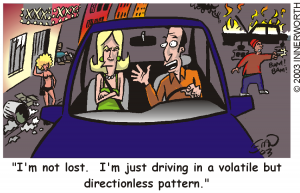If you’re driven to succeed, in all likelihood, you are an overachiever. And as an overachiever, you strive for perfection. The need for perfection can go too far, however. I’m all for striving for success, but the need for perfection seems to hinder many traders. Some traders spend most of the day neurotically searching for the ultimate setups or the ideal market conditions. 
Other traders compulsively look at redundant indicators as if seeing the same signal over and over provides new information and solace. Still, other traders feel they need to hit upon a winning streak to feel in tune with the markets, and if they don’t, they feel as if they are missing the mark, and that they might as well just give up on the trading profession altogether. Ironically, the traders who seek out perfection may never get anywhere in the long run. Had they just lowered their standards and executed trades that weren’t so “perfect,” or had only a moderate probability of success, they would have ended up more profitable.
Life would be wonderful if we were on a continual winning streak. Perhaps you traded during the bull market of the late 1990s and rode a steady wave of success, or you’ve had a hot streak that seemed like it would never end. It felt great, didn’t it? When you have a Midas touch as a trader, striving for perfection can seem like a realistic objective. But most of the time, striving for perfection just leads to feelings of disappointment. You don’t live up to your standards and you feel frustrated. Trying to live up to such high standards often sets you up for failure. It’s better to strive for more modest goals.
You don’t have to win all the time. Indeed, from a purely statistical vantage point, an extremely profitable trader can be more wrong than right as long as proper risk management is used. But many traders have difficulty taking losses in stride. From a purely psychological viewpoint, it’s hard to accept losses. First, people imbue losses with personal significance. As youngsters, many people were taught that losing money was wrong, and so even in the trading realm, where losses are commonplace, many traders feel guilty when they lose, as if they broke a parental rule. Although natural and understandable, these feelings of guilt get in the way of thinking freely. If you beat yourself up for making a losing trade, it is vital that you forgive yourself. In the trading world, you need to lose money to make money, so don’t feel bad about it.
A second issue many traders face is “all or none” thinking. They believe that unless they are on a winning streak, they are failing. It’s nice to be on a winning streak, but just because you are not on one does not mean that you are doing poorly. Imperfection should be expected. Every successful person faces setbacks, and in the trading world, a winning trader faces many more setbacks than successes. Setbacks are not a problem, but fear of setbacks is a barrier for most traders. If you are afraid to make trade after trade because you believe that you must experience win after win to be successful, you’ll avoid making trades. And if you avoid making trades, the law of averages will never work in your favor. You’ll end up in the red. It may be difficult, but you have to take some risks. You have to put on trades to make profits in the markets. Sometimes you’ll win, and many times you will lose, but your overall profit is all that matters.
Trading is a tough business. Few make it, and this fact can be daunting. If you give in to pessimism, however, you’ll never make profits. Don’t imbue losses with personal significance. Don’t think that you must be absolutely perfect. Every trade will not be a win. You’ll be wrong and you will lose. Losing isn’t your fault, but letting it get to you is. If you take losses in stride, and radically accept and appreciate any profits the markets give you, you will end up profitable in the end. And that’s the whole point, right?

